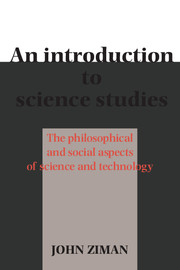Book contents
- Frontmatter
- Contents
- Preface
- 1 ‘Academic’ science
- 2 Research
- 3 Validity
- 4 Communication
- 5 Authority
- 6 Rules and norms
- 7 Change
- 8 The sociology of scientific knowledge
- 9 Science and technology
- 10 Pure and applied science
- 11 Collectivized science
- 12 R & D organizations
- 13 The economics of research
- 14 Science and the State
- 15 The scientist in society
- 16 Science as a cultural resource
- Index
- Frontmatter
- Contents
- Preface
- 1 ‘Academic’ science
- 2 Research
- 3 Validity
- 4 Communication
- 5 Authority
- 6 Rules and norms
- 7 Change
- 8 The sociology of scientific knowledge
- 9 Science and technology
- 10 Pure and applied science
- 11 Collectivized science
- 12 R & D organizations
- 13 The economics of research
- 14 Science and the State
- 15 The scientist in society
- 16 Science as a cultural resource
- Index
Summary
‘[The Scientist] must appear to the systematic epistemologist as a type of unscrupulous opportunist: he appears as a realist in so far as he seeks to describe a world independent of the acts of perception; an idealist in so far as he looks upon concepts and theories as free inventions of the human spirit (not logically derivable from what is empirically given); as positivist in so far as he considers his concepts and theories justified only to the extent to which they furnish a logical representation among sensory experiences. He may even appear as a Platonist or Pythagorean in so far as he considers the viewpoint of logical simplicity as an indispensable and effective tool in his research.’
Albert EinsteinEpistemology
Scientific knowledge takes a variety of forms, from the most obvious descriptive facts to the most abstruse and speculative theories. Yet it is often treated as a single body of information, of peculiarly high credibility. The fundamental concern of epistemology is how much of this knowledge can be considered true, or how firmly it should be believed.
The history of science should dispel any notion that all science is true. There are innumerable cases of elementary errors of observation which were long held to be facts.
Information
- Type
- Chapter
- Information
- An Introduction to Science StudiesThe Philosophical and Social Aspects of Science and Technology, pp. 34 - 57Publisher: Cambridge University PressPrint publication year: 1984
